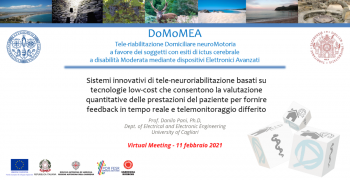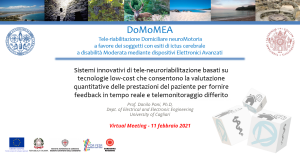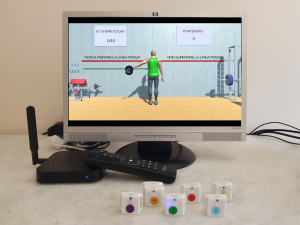
it
Lo scorso 11 febbraio 2021 il Responsabile Scientifico del progetto Danilo Pani è intervenuto per parlare del progetto DoMoMEA nella cornice di un virtual meeting organizzato dal Prof. Matteo Cioni, docente di Medicina fisica e riabilitativa dell’Università di Catania.
Lo scopo dell’intervento, dal titolo “Sistemi innovativi di tele-neuroriabilitazione basati su tecnologie low-cost che consentono la valutazione quantitative delle prestazioni del paziente per fornire feedback in tempo reale e telemonitoraggio differito”, era illustrare ai partecipanti quali potrebbero essere gli sviluppi del sistema di tele-riabilitazione domiciliare per pazienti con esiti di ictus cerebrale a disabilità moderata di tipo neuromotorio, con uno sguardo ai futuri adattamenti del sistema per il trattamento di altre patologie (problemi ortopedici o di altra natura neurologica).
In un’ora e mezza si è tentato di riassumere come, a febbraio del 2018, è nato il progetto Cluster Top-Down di trasferimento tecnologico finanziato da Sardegna Ricerche con fondi POR FESR 2014/2020, fino a descrivere cosa e chi è oggi DoMoMEA.
Grazie al video realizzato dal team di ricerca del Dipartimento di Ingegneria Elettrica ed Elettronica dell’Università degli Studi di Cagliari, in occasione della presentazione del progetto alla “Notte Europea dei Ricercatori 2020” , durante il virtual meeting è stato possibile mostrare non solo la composizione dell’intero sistema e dei suoi singoli dispositivi ma anche alcune dimostrazioni di sessioni riabilitative eseguibili dal paziente e monitorate dal terapista sull’apposita Web App.
All’interno della presentazione si sono voluti riassumere gli obiettivi che il progetto e tutto il team DoMoMEA aveva a cuore e si era prefissato di raggiungere:
• L’obiettivo primario di sviluppare un sistema di tele-riabilitazione domiciliare semi-autogestita per pazienti con esiti di ictus cerebrale con disabilità moderata di tipo neuromotorio, complementando e non sostituendo i tradizionali servizi riabilitativi;
• L’obiettivo tecnologico di integrare nel sistema dispositivi elettronici avanzati, caratterizzati da estrema semplicità d’uso e in grado di comunicare con l’infrastruttura software di telesalute sviluppata;
• L’obiettivo scientifico di studiare l’importanza della teleriabilitazione e dell’exergaming con piattaforme accessibili;
• L’obiettivo sostenibile di quantificazione del gesto motorio del paziente e di produzione automatica di report sintetici sulla prestazione nei singoli esercizi proposti al fine di garantire, da remoto, il monitoraggio quantitativo differito delle sedute riabilitative.
Infine, al termine dell’intervento, si è svolta un’animata tavola rotonda dalla quale non solo sono emersi interessanti spunti, utili sia per la validazione del sistema che per la sua estensione, ma grazie alla quale è stato possibile raccogliere importanti idee e potenziali nuove collaborazioni scientifiche.
A fine marzo si terrà il final meeting interamente dedicato ad approfondire obiettivi, risultati raggiunti e progetti futuri del progetto DoMoMEA.
en
 On 11 February 2021 Danilo Pani, the Scientific Responsible of the project, spoke about the DoMoMEA project in the frame of a virtual meeting organized by Prof. Matteo Cioni, professor of Physical and Rehabilitation Medicine at the University of Catania.
On 11 February 2021 Danilo Pani, the Scientific Responsible of the project, spoke about the DoMoMEA project in the frame of a virtual meeting organized by Prof. Matteo Cioni, professor of Physical and Rehabilitation Medicine at the University of Catania.
The purpose of the intervention, entitled “Novel tele-neurorehabilitation systems based on low-cost technologies featuring quantitative assessment of the patient’s performance for real-time feedback and off-line telemonitoring”, was to illustrate to the participants what are the developments of the home tele-rehabilitation for patients with outcomes of cerebral stroke with moderate neuromotor disability, with a look at the future adaptations of the system for the treatment of other pathologies (orthopedic or other neurological problems).
In an hour and a half an attempt was made to summarize how, in February 2018, the Cluster Top-Down technology transfer project funded by Sardegna Ricerche with POR FESR 2014/2020 funds was born, to describe what and who is today DoMoMEA.
Thanks to the video made by the research team of the Department of Electrical and Electronic Engineering of the University of Cagliari, on the occasion of the presentation of the project at the “European Researchers’ Night 2020”, during the virtual meeting it was possible to show not only the composition of the entire system and its individual devices but also some demonstrations of rehabilitation sessions that can be performed by the patient and monitored by the therapist on the appropriate Web App. 
Within the presentation we wanted to summarize the objectives that the project and the whole DoMoMEA team had at heart and set out to achieve:
• The primary objective of developing a semi-self-managed home tele-rehabilitation system for patients with moderate neuromotor disability, complementing and not replacing traditional rehabilitation services;
• The technological goal of integrating advanced electronic devices into the system, characterized by extreme ease of use and able to communicate with the developed telehealth software infrastructure;
• The scientific objective of studying the importance of remote rehabilitation and exergaming with accessible platforms;
• The sustainable objective of quantifying the patient’s motor gesture and automatic production of synthetic reports on performance in the individual exercises proposed in order to ensure, remotely, the deferred quantitative monitoring of rehabilitation sessions.
Finally, at the end of the intervention, an animated round table was held from which not only interesting ideas emerged, useful both for the validation of the system and for its extension, but thanks to which it was possible to collect important ideas and potential new scientific collaborations.
At the end of March the final meeting will be held entirely dedicated to deepening the objectives, results achieved and future projects of the DoMoMEA project.